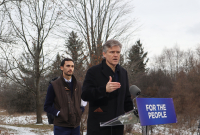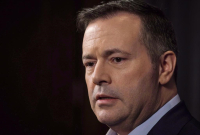Support strong Canadian climate journalism for 2025
Lawyers for Saskatchewan and its allies warn that Ottawa's justification for imposing a carbon price on consumers will erode provincial sovereignty under the Constitution.
"Giving Canada this degree of regulatory authority over (greenhouse gas emissions) will result in the limitless, intrusive federal regulatory capability over provincial affairs," William Gould, for New Brunswick's attorney general's office, an intervener in the case, said Wednesday.
"It only begins here."
Saskatchewan's legal counsel opened a two-day Appeal Court hearing by arguing that the province's constitutional challenge of a federal carbon levy is not about climate change, but the divisions of power.
"This is not a case about whether climate change is real or not," Mitch McAdam said. "The government of Saskatchewan is not made up of a bunch of climate change deniers."
He said the question is whether provinces are "sovereign and autonomous within the areas of their jurisdiction" under the Constitution Act.
"Or under our Constitution can the federal government step in whenever it thinks provinces aren't ... exercising their jurisdiction appropriately and act for them?
"That's really what this case is about."
Evidence presented that speaks to the gravity of climate change and effectiveness of carbon pricing is irrelevant, McAdam said.
"The fact that climate change is a serious issue does not override the Constitution."
Ottawa's legal position is that climate change is a national concern and the federal government has the power to impose a carbon tax under the Constitution, which states laws can be made "for the peace, order and good government of Canada."
Alan Jacobson, a lawyer for Saskatchewan, argued that Ottawa does not meet the constitutional test to use the rationale of a "national concern."
"How does an Ottawa policy turn into a national concern?" he asked.
Jacobson said "of peace, order and good government of Canada" has sweeping implications and should be approached by the court with caution.
"It's radical and intrusive. It's absolute and exclusive," he said. "It wishes to displace provincial space that today exists over these areas."
Arguments that Canada is in the right because it has international obligations to reduce greenhouse gas emissions should be dismissed, Jacobson added.
"Ottawa is not a big brother jurisdiction over the provinces even when it makes international commitments."
A panel of five judges is hearing arguments from both sides as well as from interveners such as the provinces of New Brunswick and Ontario, which are also fighting the federal carbon tax.
In total, there are 16 groups intervening in the case.
Ottawa is to get its turn to present its side Thursday. Saskatchewan will have a chance to respond. Interveners in favour of a carbon tax will also speak, including Indigenous groups and environmentalists.
The Saskatchewan Party government argues a federal carbon levy is unconstitutional because it's not applied evenly across Canada and intrudes on provincial jurisdiction. Provinces that already have their own carbon-pricing plan are not subject to the federal tax.
Saskatchewan is one of four provinces without a plan that will be subject to Ottawa's fuel charge starting in April. New Brunswick, Ontario and Manitoba are the others.
The federal government's carbon price starts at a minimum at $20 a tonne and rises $10 each year until 2022.
Before the hearing started, University of Alberta law professor Eric Adams said the constitutional arguments are significant.
"I would put this case on a short list of important federalism decisions that courts have grappled with," Adams said.





Comments
Yet again, the kids are fighting in the sandbox! The only positive hint of hope here is that at least some of these lawyers agree about the existence of climate change. However they have totally missed the mark about what a GLOBAL issue it is!! Therefore every action taken MUST be done on as GLOBAL a scale as possible!!!
Sovereignty? Isn't that a rather slippery argument these days? The OED has a plethora of definitions for the word - all of them deriving from the now outmoded "divine right" of monarchs. The few remaining monarchs with old fashioned political power are scarcely models of good governance.
Here we are living in a world whose "borders" are essentially meaningless - though the knaves and cowards posturing as would-be rulers cling to them like life rafts in a raging sea.
Global warming means just that - warming, with all its potentially lethal and uncertain effects is a matter of planetary, existential, concern.